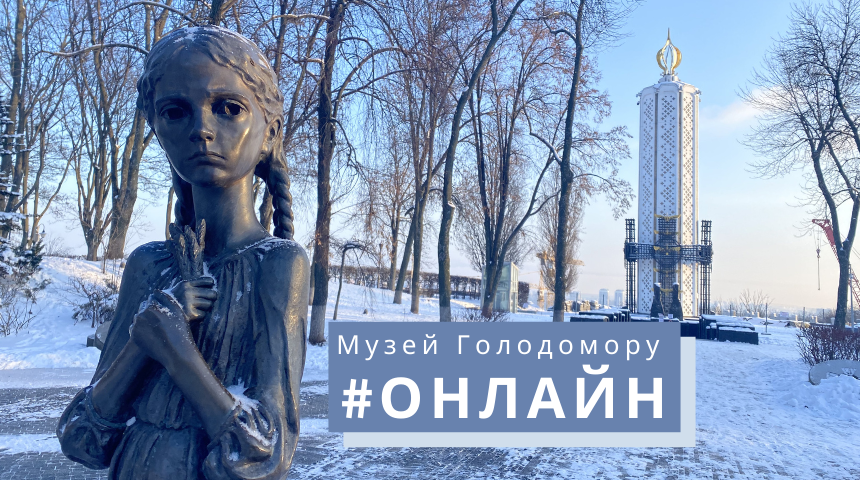Holodomor Museum team has conducted online tours for 1,000 viewers
Employees of the Holodomor Museum have created a video tour. You can visited the museum from anywhere in Ukraine or the world. In 2 months, more than 1,000 spectators from 14 regions of Ukraine, as well as Jordan and the United States, used this opportunity.
The format of the video tour allows you to learn about the history of the Holodomor, watch excerpts from video chronicles, listen to the eyewitnesses’ accounts, see unique items that are not included into the main exhibition, and visit the museum online.
Як відбувається відеоекскурсія?
The video tour is designed for students from 13 years and adults. It consists of two parts. The first is a video tour of the Holodomor Museum, during which one can learn the Holodomor history, understand why the Holodomor is the genocide of Ukrainians and why it is important to preserve family and national memory. The second part is held in the video conference format through Zoom meeting. A museum employee answers the questions, explains the unclear points and provides additional information.
The tour lasts for 45 minutes. It is avaliable daily from 10 a. m. to 5 p. m.
The opportunity to visit the video tour will remain after the quarantine, because due to it children and adults from all over Ukraine and abroad can get to the Museum. Also, the museum will soon present an English-language version to make the online visit accessible and comfortable for foreigners and Ukrainians worldwide.
How to book a video tour?
To visit the museum online, you must register in advance (at least three days before).
How much does it cost?
The video tour costs UAH 13 per person; minimal group is 5 people (when booking a tour for a smaller number of participants, payment is made for 5 people).
How else can you learn the Holodomor history online?
In 2020, the Holodomor Museum together with Ukraїnerimplemented a bilingual multimedia project “Holodomor: Mosaics of History”, as a result of which the teams visited 64 villages and recorded the testimonies of 120 eyewitnesses. Video stories of Holodomor witnesses and materials about the myths, consequences, history and world context of the Holodomor can be viewed on the website and Youtube channel of Ukraїner. The project was implemented with the support of UCF.
You can learn about the history of the Holodomor in Kyiv with the mobile application “Track Holodomor History”. Through eyewitnesses’ stories, archival photos, documents, comics you can explore the history of the modern capital of the 1930s. The application is available on the AppStore and GooglePlay platforms. It is available in Ukrainian and English. The project was implemented with the support of UCF.
“Testimonies” resource. This online page contains video and audio testimonies, photos and digitized text memoirs of eyewitnesses of the Holodomor of 1932–1933 and the mass artificial famines of 1921–1923, 1946–1947. Testimonies can be found by place, time, surname or hashtag.
In 2008, the 19 volumes of National Book of Memory of the Victims of the Holodomor of 1932–1933 in Ukraine were published. The Martyrology of the Book of Remembrance includes about a million names. You can explore the history of your family, city or village on the website of the Holodomor Museum through digitized books and the Unified Register of Holodomor Victims.
If the register does not contain the name of a person whose death during the Holodomor is reliably known, please fill in the registration card at the link. Museum staff will process the information and include it into the Unified Register of Holodomor Victims.
The museum team also created an online map “Places of Mass Graves of the Holodomor Genocide Victims”, developed on the basis of archival materials, eyewitnesses’ accounts, researches and communication with local historians and witnesses.
To contact the Museum, please call (044) 254-45-11 / (044) 254-45-12 or email to [email protected].
To get more information about the ourprojects and to support them informationally, please contact us by e-mail [email protected] or by calling +380674397507 (Olga Syrotiuk, museum communications manager).
